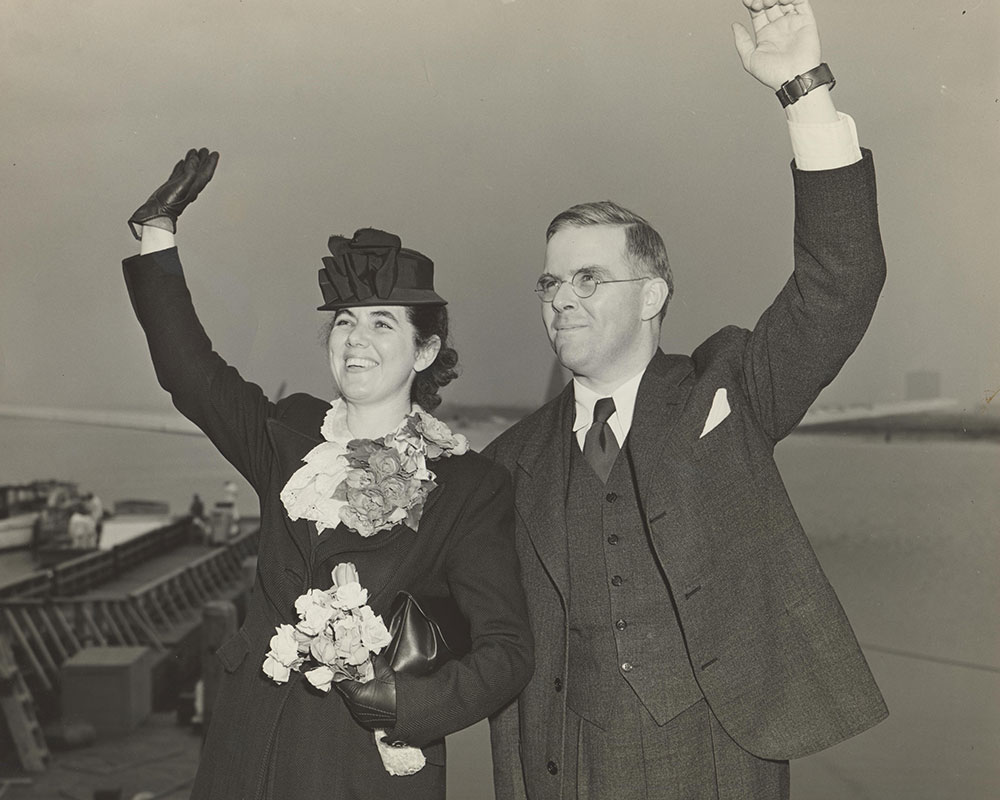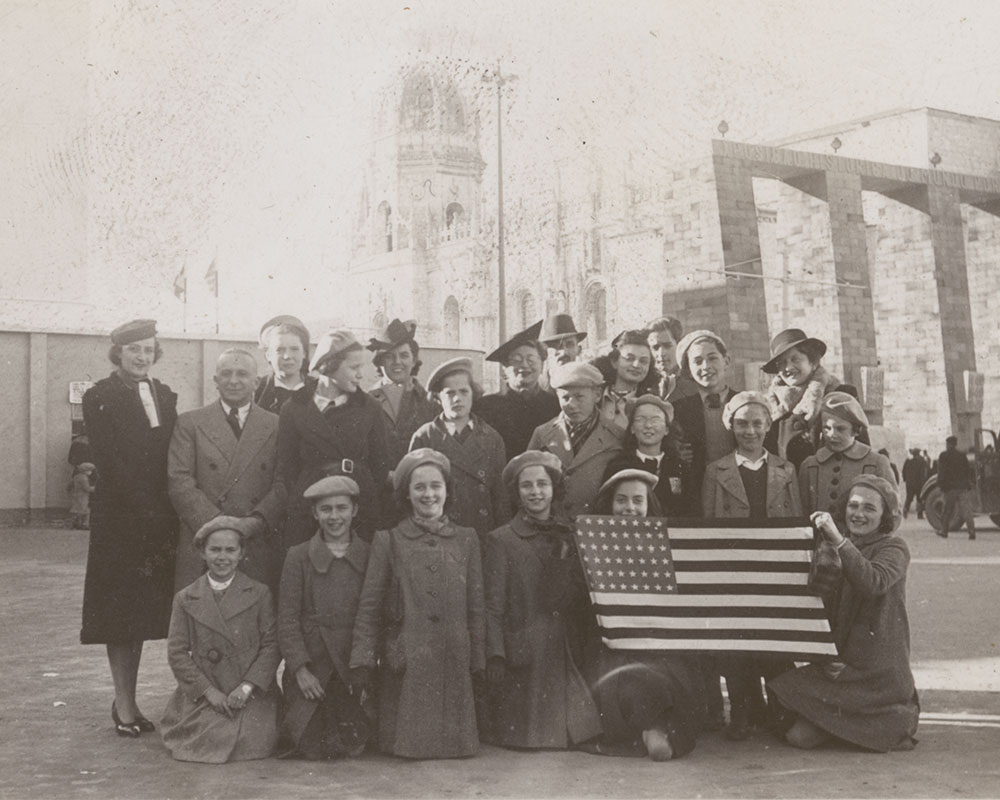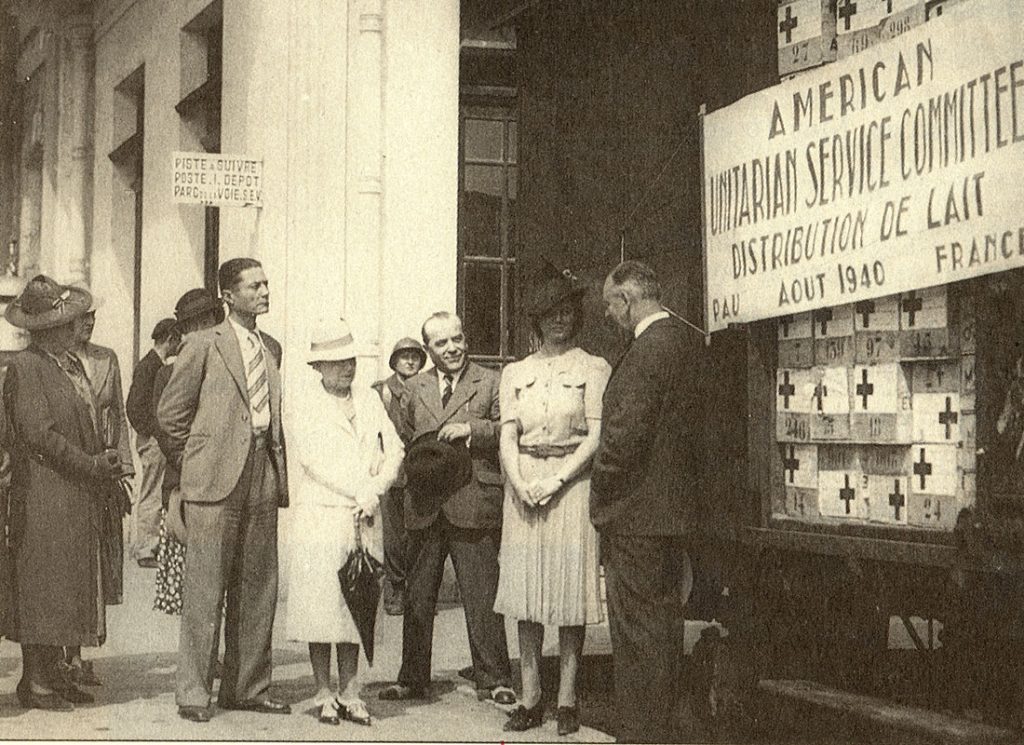The Unsung Heroes: Waitstill and Martha Sharp’s Courageous Rescue Missions During World War II

In the darkest days of World War II, as the Nazi regime tightened its grip across Europe and millions of lives hung in the balance, two ordinary Americans embarked on an extraordinary mission of mercy. Waitstill Sharp, a Unitarian minister from Wellesley, Massachusetts, and his wife Martha, a social worker, left behind their comfortable lives and young children to answer a call that would place them at the centre of one of history’s greatest humanitarian crises.
The Sharps’ story is one of unwavering courage, quick thinking, and selfless dedication to saving lives in the face of unimaginable danger. Over the course of two perilous missions to Europe in 1939 and 1940, the couple worked tirelessly to rescue hundreds of Jews, intellectuals, and children from the expanding threat of Nazi persecution. Their efforts, long overlooked by history, stand as a testament to the power of individual action in the face of overwhelming evil.
The Call to Action:
The Sharps’ journey began in January 1939, as the storm clouds of war gathered over Europe. However, their story is deeply rooted in the tumultuous events of the early 1930s. The American Unitarian Association, alarmed by reports of escalating persecution in Nazi-controlled territories, sought volunteers willing to travel to Czechoslovakia to assist refugees and endangered individuals. Despite the risks and the fact that they would have to leave behind their two young children, Waitstill and Martha felt compelled to answer the call.
In 1933, a pivotal year in world history, three significant events occurred that would shape the course of the coming decade: Waitstill Sharp was ordained as a Unitarian Minister, Franklin Roosevelt was inaugurated as President of the United States, and Adolf Hitler was named Chancellor of Germany. These concurrent events set the stage for the dramatic collision of ideologies and the humanitarian crisis that would unfold in the years to come.
As Hitler’s power grew and persecution escalated in Nazi-controlled territories, the American Unitarian Association became increasingly alarmed. In early 1939, they sought volunteers willing to travel to Czechoslovakia to assist refugees and endangered individuals. Despite the risks and the fact that they would have to leave behind their two young children, Waitstill and Martha felt compelled to answer the call.
Their decision to volunteer was not made lightly. Waitstill had been serving as a minister for six years, witnessing from afar the growing crisis in Europe. Martha, with her background in social work, was acutely aware of the human cost of political upheaval. Together, they felt a moral imperative to act, even if it meant leaving the safety and comfort of their lives in Wellesley, Massachusetts.
On February 4, 1939, just weeks before Hitler’s forces would march into Prague, the Sharps arrived in Czechoslovakia. They were woefully unprepared for the magnitude of the crisis they would face, but they were determined to do whatever they could to help. Little did they know that their decision would place them at the centre of one of history’s greatest humanitarian crises, where their actions would directly challenge the destructive forces that had been set in motion in that fateful year of 1933.
First Mission: Czechoslovakia 1939

Upon their arrival in Prague, the Sharps quickly established a network of contacts and began their rescue operations. They worked closely with the Unitarian Service Committee, using their cover as relief workers to assist those in desperate need of escape.
One of their first significant actions was to help prominent Czech intellectuals and political figures flee the country. Among those they aided was a member of the Czech parliament and his family. The Sharps provided them with the necessary documents and funds to escape to England, likely saving them from arrest and possible execution by the Nazi regime.
As the political situation deteriorated rapidly, the Sharps found themselves in a race against time. They worked feverishly to arrange exit visas, secure travel documents, and provide financial assistance to those seeking to flee. Their efforts became even more urgent after March 15, 1939, when German forces occupied the remainder of Czechoslovakia.
In the chaos that followed, the Sharps demonstrated remarkable ingenuity and courage. They used their American passports to bluff their way past Nazi guards, smuggled endangered individuals across borders, and even concealed important documents and money in their clothing to avoid detection.
One particularly daring rescue involved a group of Jewish refugees who had been turned back at the Polish border. The Sharps arranged for a train to pick up the group, using their connections to ensure safe passage through Slovakia and eventually to England. This operation alone saved dozens of lives that would have otherwise been lost to Nazi persecution.
The couple’s work did not go unnoticed by the Gestapo, Nazi Germany’s secret police. They were frequently questioned, and their offices were repeatedly searched. Despite the constant threat of arrest or worse, the Sharps persevered, often working around the clock to assist as many people as possible.
In August 1939, with war imminent and their own safety increasingly at risk, the Sharps were forced to leave Czechoslovakia. They had been in the country for six months, during which time they had helped hundreds of refugees escape to safety. But their work was far from over.
Second Mission: France 1940
After a brief return to the United States, the Sharps felt compelled to continue their rescue efforts. In June 1940, they embarked on their second mission, this time to France, which had recently fallen to Nazi Germany.
The situation in France was even more precarious than it had been in Czechoslovakia. The country was divided into occupied and unoccupied zones, with the Vichy regime collaborating with the Nazis in the south. Refugees from all over Europe had flooded into France, desperately seeking a way out as the noose of Nazi control tightened.
The Sharps established their base of operations in Marseille, a key port city that had become a bottleneck for those trying to flee Europe. Here, they faced not only the ever-present threat of the Gestapo but also the bureaucratic maze of the Vichy government, which was increasingly complicit in the deportation of Jews and other targeted groups.
One of the Sharps’ most significant achievements during this period was their work with the Emergency Rescue Committee (ERC), an American organization dedicated to saving Europe’s intellectual and artistic elite from Nazi persecution. The Sharps worked closely with Varian Fry, the ERC’s representative in Marseille, to identify and assist high-profile individuals at risk.
Through this collaboration, the Sharps played a crucial role in the rescue of numerous prominent figures, including:
- Lion Feuchtwanger, a German-Jewish novelist and outspoken critic of the Nazi regime. The Sharps helped smuggle Feuchtwanger out of an internment camp and, in a particularly daring move, Martha disguised him as a woman to escort him safely to New York.
- Heinrich Mann, the elder brother of Thomas Mann and a renowned author in his own right. The Sharps assisted in arranging his escape from France to Spain and ultimately to the United States.
- Franz Werfel, an Austrian-Bohemian novelist, playwright, and poet, along with his wife Alma Mahler-Werfel. The couple had narrowly escaped from their home in Austria and were hiding in Lourdes when the Sharps helped facilitate their journey to America.
But the Sharps’ efforts were not limited to saving cultural luminaries. They worked tirelessly to assist ordinary refugees, many of whom were Jewish families desperate to escape the tightening grip of Nazi persecution.
One of their most ambitious and heartbreaking projects involved the rescue of children. Working with the U.S. Committee for the Care of European Children, Martha Sharp organized a transport of 27 children from France to the United States. This group included not only Jewish children but also the children of prominent anti-Nazi activists who were at risk of arrest or worse.
The process of arranging this transport was fraught with challenges. Martha had to navigate a labyrinth of bureaucratic red tape, securing exit visas, transit visas, and entry permits for each child. She also had to convince often reluctant parents to part with their children, promising to reunite the families in America when possible.
On August 8, 1940, Martha personally escorted this group of children from Marseille to New York, traveling through Spain and Portugal. The journey was perilous, with the constant threat of discovery by Nazi sympathizers or submarine attacks on their Atlantic crossing. Yet, against all odds, Martha successfully delivered all 27 children to safety in the United States.
This children’s transport was just one of many rescue operations the Sharps undertook during their time in France. They continued to work tirelessly, often operating in the gray areas of legality, to save as many lives as possible. They forged documents, bribed officials, and used every means at their disposal to secure safe passage for those in danger.
The Aftermath and Legacy:
The Sharps’ second mission came to an end in December 1940, when mounting dangers and their own exhaustion forced them to return to the United States. Over the course of their two European missions, it is estimated that the Sharps directly assisted in the rescue of hundreds of individuals, and their work indirectly saved many more.
Upon their return, the Sharps continued to advocate for refugees and worked to raise awareness about the plight of those still trapped in Nazi-controlled Europe. Waitstill returned to his work as a minister, while Martha became involved in various humanitarian causes, including continued efforts to rescue children from war-torn Europe.
The full extent of the Sharps’ wartime activities remained largely unknown for many years. Like many who engaged in rescue work during the Holocaust, they rarely spoke about their experiences, preferring to focus on the work that still needed to be done rather than dwelling on past accomplishments.
It wasn’t until decades later that the Sharps’ extraordinary efforts began to receive wider recognition. In 2006, Yad Vashem, Israel’s official memorial to the victims of the Holocaust, recognized Waitstill and Martha Sharp as “Righteous Among the Nations.” This honor, bestowed upon non-Jews who risked their lives to save Jews during the Holocaust, placed the Sharps alongside such figures as Oskar Schindler and Raoul Wallenberg.
In 2016, the Sharps’ story reached a broader audience with the release of the Ken Burns documentary “Defying the Nazis: The Sharps’ War.” This film, co-directed by the Sharps’ grandson Artemis Joukowsky, brought their remarkable story to life through interviews, archival footage, and dramatic reenactments.
The Significance of the Sharps’ Actions:
The rescue efforts of Waitstill and Martha Sharp are significant not only for the lives they saved but for what they represent in the broader context of the Holocaust and World War II.
First, their story highlights the power of individual action in the face of overwhelming evil. At a time when many governments, including the United States, were reluctant to act decisively to aid refugees, the Sharps demonstrated that ordinary people could make a profound difference. Their actions serve as a powerful rebuke to those who claimed ignorance or helplessness in the face of Nazi atrocities.
Second, the Sharps’ work underscores the importance of international cooperation in humanitarian efforts. Throughout their missions, they worked closely with a network of individuals and organizations from various countries, all united in the common cause of saving lives. This collaboration across borders and cultures was crucial to the success of their rescue operations and serves as a model for addressing humanitarian crises today.
Third, the Sharps’ story challenges us to consider what we might do in similar circumstances. Their decision to leave behind their comfortable lives and young children to undertake dangerous missions in war-torn Europe was extraordinary. It forces us to confront difficult questions about moral courage and personal sacrifice in the face of injustice. Finally, the long delay in recognizing the Sharps’ contributions reminds us of the many unsung heroes of the Holocaust era. For every well-known figure like Oskar Schindler, there were countless others who worked in anonymity to save lives. The gradual uncovering of these stories enriches our understanding of this dark period in history and provides important counterpoints to narratives of widespread complicity or indifference.

Conclusion:
The story of Waitstill and Martha Sharp is one of ordinary people rising to meet extraordinary challenges. Their courage, resourcefulness, and unwavering commitment to helping others in the face of tremendous danger serve as an inspiration and a challenge to future generations.
In a world that continues to grapple with refugee crises, persecution, and human rights abuses, the Sharps’ legacy reminds us of the profound impact that individuals can have when they choose to act. Their story calls us to remain vigilant against the forces of hatred and intolerance, and to be ready to stand up for the vulnerable and persecuted, no matter the personal cost.
As we reflect on the Sharps’ remarkable journey, we are left with a powerful message: in the darkest of times, acts of compassion and courage can light the way forward. The challenge for each of us is to carry that light forward, to be willing to act in defence of human dignity and to never lose sight of our shared humanity, even in the face of seemingly insurmountable odds.
The rescue missions of Waitstill and Martha Sharp stand as a testament to the best of human nature and a beacon of hope for future generations. Their legacy challenges us all to consider: what will we do when faced with injustice? How will we respond to the call to help those in desperate need? In answering these questions, we honour the memory of the Sharps and all those who risked everything to save lives during humanity’s darkest hour.

